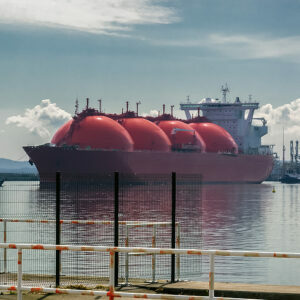Whether southeastern Pennsylvania becomes the base for a liquified natural gas terminal remains unclear after the release of a much-awaited report from the bipartisan Philadelphia LNG Export Task Force.
“Our abundant natural gas resources not only fuel economic growth within the commonwealth but also offer us a unique opportunity to meet growing energy demand across the globe while creating tens of thousands of jobs and generating billions of dollars in yearly economic activity that can benefit communities in the Southeast region,” said task force Chair Rep. Martina White (R-Philadelphia).
Recommendations in the final report include:
- Facilitating pathways to support the current skilled labor workforce and workforce of the future by promoting educational opportunities and partnerships with the industry, institutions of higher education, and K-12 schools—especially those located in the Greater Philadelphia area and surrounding communities.
- Streamlining and improving the permitting process in Pennsylvania to balance regulatory considerations with the need for an effective and efficient permitting process to attract investment in Pennsylvania.
- Calling on Congress to reform the Jones Act to facilitate the transport of LNG between U.S. ports.
“As this report shows, Pennsylvania is poised to help address the increasing global demand for affordable, reliable energy by leveraging its abundant supply of natural gas and exporting LNG overseas,” said Stephanie Catarino Wissman, executive director of American Petroleum Institute Pennsylvania. “Under the leadership of Rep. White, this task force has put forth a comprehensive report and roadmap for Pennsylvania to establish an LNG export facility that would bring significant new investment and economic growth to the region and generate thousands of new jobs. Advancing the recommendations outlined in the report, including permitting reform at the state and federal level, is critical to developing an LNG export terminal and thus expanding Pennsylvania’s role as a global energy leader.”
Task Force member Sen. Gene Yaw (R-Bradford) said, “Pennsylvania’s diverse energy portfolio, robust energy sector, and extensive geological formations make us uniquely qualified to address the demand for affordable and reliable energy.”
“We already know the benefits of an LNG terminal are far too great to ignore, and the final report of the task force serves as a solid roadmap to position Pennsylvania as a global leader in energy exportation,” said Yaw, who chairs the environmental resources and energy committee. “Through the report’s recommendations to streamline the permitting process, strengthen our skilled labor workforce, and facilitate the safe and efficient transportation of LNG, we have the potential to create jobs, support economic development, reduce harmful emissions, and restore energy independence to this country.”
Toby Z. Rice, president and chief executive officer of EQT Corporation, a natural gas producer, sees this as a moment to seize the economic opportunity from the state’s standing as “a leading energy supplier.”
“For the first time in decades, the number of people without access to electricity increased in 2022. The task force’s report is clear – making clean, affordable, reliable Appalachian natural gas available on a global scale will increase energy security, decrease global emissions, and promote family-sustaining jobs across the Commonwealth. We have an incredible opportunity before us to unleash U.S. LNG from Pennsylvania, which will address the global energy shortage and generate thousands of jobs for Pennsylvanians,” Rice said.
Jim Snell, business manager of Steamfitters Local 420, likes what he sees in the report. “I am thrilled with the adoption of the final report from the Philadelphia LNG Export Task Force. This is an important step toward realizing the economic benefits of an LNG export terminal in our region, which can create thousands of well-paying union jobs and support the hard-working men and women in our community.”
White said the recommendations in the report are aimed at growing Pennsylvania’s economy, supporting Pennsylvania workers, and developing the future workforce.
“The adoption of this report is especially important in light of the decision by the Pennsylvania Commonwealth Court voiding Pennsylvania’s entrance into the Regional Greenhouse Gas Initiative (RGGI), a multi-state energy tax program that would have increased energy costs for Pennsylvanians,” said White. “We have the opportunity to not only increase energy production safety and efficiently and work toward reducing energy costs for Pennsylvania consumers.”
Carl Marrara, executive director of the Pennsylvania Manufacturers’ Association, conducted an economic analysis, finding the LNG export facility would benefit the local, regional, and statewide economies.
“Assuming a four-year constriction phase, a similarly sized LNG export facility would produce over 7,000 jobs per year, with approximately $575.35 million in labor income alone added to the state and local economy. In total, construction of the facility would add approximately $1.195 billion in total yearly economic output.
“The industries most positively impacted from the increase in economic activity are those in the skilled trades, led by jobs created for the construction of the facility structures, as well as commercial and industrial machinery repair, concrete manufacturing and fabricated pipe and fitting manufacturing,” Marra said.
However, some local officials are lining up to oppose any LNG development.
Chester Mayor-elect Stefan Roots told DVJournal he is concerned about pollution and the danger an LNG terminal might bring.
“There’s a public health and public safety issue first and foremost,” said Roots. Typically, these plants are built on at least 1,000 acres of “unpopulated land,” he said. “To squeeze all that onto 100 acres displaces dozens and dozens of families, churches, and established entities here to create the blast zone that they need, which indicates this is not a safe business, is something I don’t like.”
It is also unclear whether Gov. Josh Shapiro will support the effort to locate an LNG facility in the Delaware Valley. His spokesperson did not respond when asked whether the governor supports an LNG terminal for southeastern Pennsylvania.
The bipartisan Philadelphia LNG Export Task Force was comprised of members of the General Assembly, representatives of the natural gas industry, organized labor, the Port of Philadelphia, Philadelphia Gas Works, the mayor of Philadelphia, and members of the governor’s administration.

